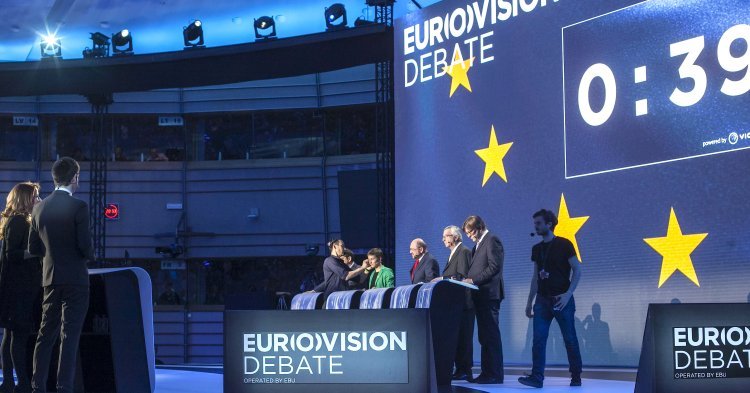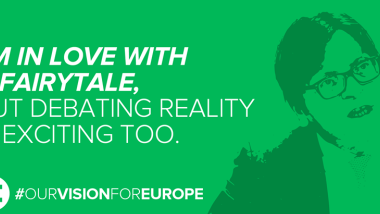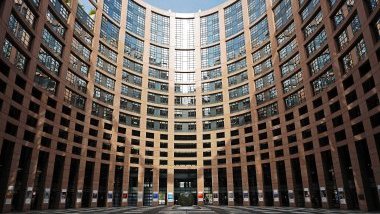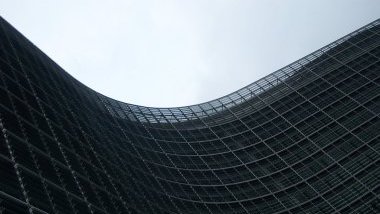Last week, the European edition of POLITICO published a piece on the so-called “Spitzenkandidaten” – the system of top candidates to the post of President of the European Commission (hereinafter, POTEC). Quite unsurprisingly, the piece is rife with inaccuracies and straw man arguments, resulting in a general, soft-spoken Eurosceptic tone to the whole article. The Young European Federalists [JEF] have been long-standing supporters of the system (our section in Germany even has a successful campaign on the matter). I will try here to briefly explain why, drawing also from JEF’s resolutions on the transnational dimension of European elections and on the structure of a federal European Parliament.
Coalition politics
The first thing that the piece gets wrong is the election of Juncker: he was not elected POTEC because his own European People’s Party, EPP, ended up first in the 2014 European elections. Juncker was elected because he managed to build a majority in the European Parliament (a so-called “grand coalition” arrangement with the centre-left Progressive Alliance of Socialist and Democrats, S&D, and the centrist Alliance of Liberals and Democrats for Europe, ALDE). This coalition was formed the basis of shared political priorities, such as: the launch of the Investment Plan (whose most famous part is EFSI, the European Fund for Strategic Investment) and a push towards more use of the flexibility clauses within the Stability and Growth Pact (the set of EU fiscal rules).
Early in 2017, after Martin Schulz resigned to contest national elections in Germany, this coalition agreement fell apart, officially because the three parties ceased to find value in their cooperation. The EP is now ruled by a right-wing majority comprising the EPP, ALDE and the group of European Conservatives and Reformists, the ECR, after it managed to elect Antonio Tajani as President of the Parliament.
Something that is worth noting here is that the EU’s incomplete parliamentary democracy system hardly allows for changes in parliamentary majorities to have institutional consequences – indeed, that’s precisely the reason JEF Europe calls for the future federal EP to allow for motions of no confidence towards the Commission that lead to putting in place a new Executive.
Strangely enough for a news outlet having crossed the Atlantic to launch its business in Europe, Politico relishes on criticising the Spitzenkandidaten process, despite it signalling a move towards a Presidential system, like its native US. Their claim that the process is “driven by party insiders” is only true insofar as EU political parties allow for it! And even if in JEF we look with keen interest at US-style primaries to select the candidates for POTEC, these don’t need to be the rule. Party congresses are a democratic tool in their own right.
Some parties actually applied a primary-style process already in the 2014 elections, like the European Greens. The Party of European Socialists had started preparations for such a system, until Martin Schulz turned out to be the only candidate. EPP and ALDE eventually also held a Party Congress to elect their lead candidate.
A tool for populists?
Further in the article and elsewhere in the “EU bubble”, the Spitzenkandidaten system (and for that matter, transnational lists that would complete the Europeanisation of EP elections) has been indicated as the tool for populists and Eurosceptics to elect the President of the Commission from their own ranks and thus crack the EU open, at last.
As recalled, Juncker was elected POTEC as a result of the Grand Coalition deal. If an anti-EU Spitzenkandidat was put forward - itself doubtful – and won the 2019 elections, he or she would still need a majority of the votes of MEPs, and a pro-EU majority wouldn’t support such candidate, would it?
It is also not true that the Spitzenkandidaten violates the Treaties (or you’d hope the EU Court of Justice would have picked up on it, by now). Like in 2014, the European Council formally retains the right to nominate POTEC, but if he or she is not elected by MEPs, then the European Council will have to nominate someone else. And so on and so forth until it’s one of the Spitzenkandidaten – thus putting forward the EU as a “Europe of the Citizens”, instead of as a “Europe of Nation-States”.
All in all, and, as I said, unsurprisingly, it seems POLITICO Europe is in the business of questioning the whole idea of a political union of Europe - which is fine, but then they could just be more transparent about it. They should engage with well-founded criticism, instead of misrepresenting what they report on.
For European democracy
This is not to say that the EU is perfect and that we shall not dare question it. There are, in fact, legitimate and important discussions to have on these issues: for instance, should the EU have more competences on social policy? Are transnational lists the tool for a more European debate during EP elections? Does the Spitzenkandidaten system mean the EU is moving towards a presidential system, and is that what we want?
For instance, we in JEF are far from cheerleaders of EU institutions. We believe that, while every system has flaws, a federal Europe would address the incomplete construction of the European project. When we say #toFedEU, that is an engagement for supranational democracy. It should now be clear that some matters – climate protection, defence, migration, economic and social policy – have to be dealt with at macro-regional or even global level. But then it should be just as clear that democracy at national-level just can’t safeguard the interests of citizens any more.
#OurEurope is democratic, and that’s what we stand for since 1972 - and what we’ll stand for during the European elections next year, too.








Follow the comments: |
|
